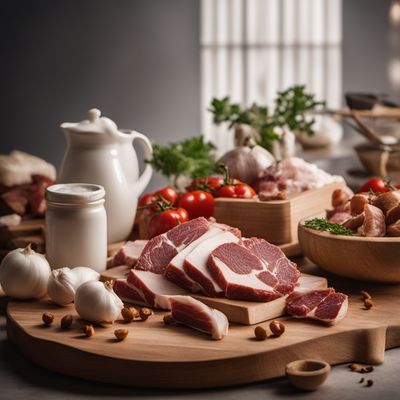
Ingredient
Rabbit, other slaughtering products
The Versatile Delicacy: Rabbit and Slaughtering Products
Rabbit meat is known for its delicate flavor and tender texture, making it a popular choice among chefs and home cooks alike. It has a mild, slightly gamey taste that pairs well with a variety of herbs, spices, and sauces. Slaughtering products, such as offal and specialty cuts, provide additional options for those seeking to explore the diverse flavors and textures that rabbit has to offer.
Origins and history
Rabbit meat has been consumed for centuries and is considered a delicacy in many cultures around the world. It has a rich history in European cuisine, particularly in countries like France and Italy, where it is commonly used in traditional dishes such as rabbit stew and roasted rabbit. Slaughtering products, including offal like rabbit liver and kidneys, have also been valued for their unique flavors and nutritional benefits.
Nutritional information
Rabbit meat is a lean source of protein and provides essential nutrients such as iron, zinc, and vitamin B12. It is lower in fat and cholesterol compared to other meats, making it a healthier option for those watching their dietary intake. However, rabbit meat may not be suitable for individuals with certain dietary restrictions or allergies.
Allergens
Rabbit meat may cause allergic reactions in individuals with a sensitivity to game meats. It is important to consult with a healthcare professional if you have any concerns or known allergies before consuming rabbit meat or slaughtering products.
How to select
When selecting rabbit meat, look for cuts that are firm and moist, with a pinkish hue. Avoid meat that appears dry or discolored. For slaughtering products like offal, choose organs that are fresh, firm, and free from any unpleasant odors. It is recommended to purchase rabbit meat and slaughtering products from reputable sources, such as trusted butchers or farmers markets, to ensure quality and freshness.
Storage recommendations
To maintain the freshness of rabbit meat, store it in the refrigerator at a temperature below 40°F (4°C). It is best to use fresh rabbit meat within 2-3 days of purchase. Slaughtering products should be stored in a similar manner and used within a shorter time frame to maintain their quality.
How to produce
Raising rabbits for meat can be done on a small scale, even in urban environments. It requires proper housing, feeding, and care to ensure the health and well-being of the animals. Consult with local regulations and guidelines before embarking on rabbit farming.
Preparation tips
Rabbit meat can be prepared using various cooking techniques, including roasting, grilling, braising, and stewing. It pairs well with herbs such as rosemary, thyme, and sage, as well as flavors like mustard, garlic, and wine. Slaughtering products like rabbit liver can be pan-seared or used in pâtés and terrines for added richness and depth of flavor.
Culinary uses
Rabbit meat is commonly used in a variety of dishes, including stews, roasts, pies, and sausages. It is also a popular choice for terrines, pâtés, and rillettes. Slaughtering products like rabbit liver and kidneys can be used in traditional recipes or incorporated into innovative dishes to add unique flavors and textures.
Availability
Rabbit meat is widely available in many countries, particularly in Europe and North America. It can be found in specialty butcher shops, farmers markets, and some supermarkets. Slaughtering products may be less commonly available and may require special ordering or sourcing from specialty suppliers.
More ingredients from this category

Equine other slaughtering products (generic)
Unveiling the Culinary Secrets of Horse Meat

Wild boar, other slaughtering products
Untamed Delicacies: Exploring the World of Wild Boar and Slaughtering Products

Goat other slaughtering products
Beyond Meat: Goat Edition

Sheep other slaughtering products
Versatile Ingredients: Sheep Offal

Bovine other slaughtering products
Beyond the Steak: Exploring Bovine Offal

Deer, other slaughtering products
The Wild Delicacy: Deer and Slaughtering Products

Pig other slaughtering products
Exploring the Versatility of Pork By-Products